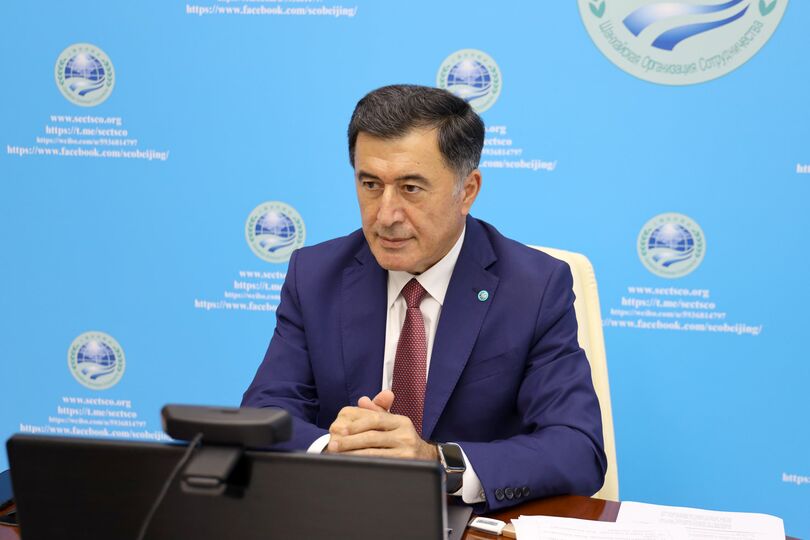On 2 September 2020, SCO Secretary-General Vladimir Norov took part in a webinar on "India-SCO Engagement: The Next Steps" organised by the Indian Council of World Affairs.
In his opening remarks, the SCO Secretary-General said that India's accession to the SCO gave it a new impetus for development and dynamism as well as an increased capacity to face modern challenges and threats. It has also strengthened the SCO as a vital tool of regional and global politics, security and sustainable development.
Vladimir Norov was highly appreciative of the initiatives and proposals that Prime Minister of India Narendra Modi put forward at the SCO summits in Qingdao and Bishkek: "These initiatives and proposals were aimed at intensifying cooperation on regional security and strengthening economic and humanitarian cooperation."
He also dwelled on new prospects for trade and economic cooperation that had emerged after India joined the SCO, noting that a North-South transport corridor could considerably expand regional ties and create conditions for the steady economic development of the SCO member states. Mr Norov stated that his Organisation prioritised cooperation in this sphere.
He also mentioned India's projects and potential in areas such as the startup industry, ICT, health, pharmaceuticals, traditional medicine, tourism, digital technologies in education, communications, and railway infrastructure.
Mr Norov pointed to New Delhi's strengths in the pharmaceutical industry and healthcare. In his opinion, India has huge potential for cooperation in this sector, including the creation of telehealth networks in SCO member states.
Mr Norov pointed to New Delhi's strengths in the pharmaceutical industry and healthcare. In his opinion, India has huge potential for cooperation in this sector, including the creation of telehealth networks in SCO member states.
He welcomed India's proposal to establish a subgroup on cooperation in the area of traditional medicine and hold a SCO videoconference dedicated to traditional medicine, saying that "India's contribution to promoting and preserving traditional medicine merits special attention; the member states can benefit from these initiatives."
In this context, Mr Norov expressed hope that India would be active in drafting an SCO Programme of Cooperation for the Development of Traditional Medicine.
He also suggested that New Delhi expand its collaboration with the SCO Business Council, the SCO Interbank Consortium, and the SCO University.
Secretary-General Norov also stressed the importance of paying attention to young people in the SCO region and of prospects for involving the younger generations in business and startup projects. He stated that India was leading the world in terms of the size of its startup ecosystem and commended the participation of young people in the creation and management of various startups in the country.
Secretary-General Norov also stressed the importance of paying attention to young people in the SCO region and of prospects for involving the younger generations in business and startup projects. He stated that India was leading the world in terms of the size of its startup ecosystem and commended the participation of young people in the creation and management of various startups in the country.
Stressing the SCO region's historical and cultural interconnections, Mr Norov noted that the SCO space had sufficient potential for developing the tourism industry and that the Eight Wonders of the SCO project was a great success. To develop and promote the project, it was proposed that a presentation of the Eight Wonders in India be staged as part of the upcoming international tourist exhibitions and SCO events.
In conclusion, Vladimir Norov noted in particular India's close cooperation with ASEAN countries and expressed hope that the country would take an active part in implementing the List of Possible Events between the SCO and ASEAN Secretariats for 2019-2020, in keeping with the Memorandum of Understanding between the SCO Secretariat and the ASEAN Secretariat signed on 21 April 2005.
In his welcoming remarks, Director General of the Indian Council of World Affairs T.C.A. Raghavan emphasised that India was interested in multilateral cooperation with the SCO member states, specifically in trade, the economy and healthcare against the background of COVID-19. He also supported the SCO Secretary-General's view on the need to pay more attention to developing cultural cooperation and to youth affairs.
In his turn, Vikas Swarup, Secretary of the Ministry of External Affairs of India, thanked the SCO Secretary-General for his participation and noted that his country was preparing to host the upcoming meeting of the SCO Heads of State Council. He noted the importance of all the main initiatives that India had undertaken or proposed within the SCO in such areas as tourism, cultural, humanitarian, trade and economic cooperation. He also stated that India would benefit from regional and multilateral cooperation with the SCO.
The event was attended by more than 50 experts, researchers and ambassadors from India.
The Indian Council of World Affairs (ICWA), the leading think tank in the country, was established in 1943. Since 2001, ICWA is officially an Institution of National Importance.
